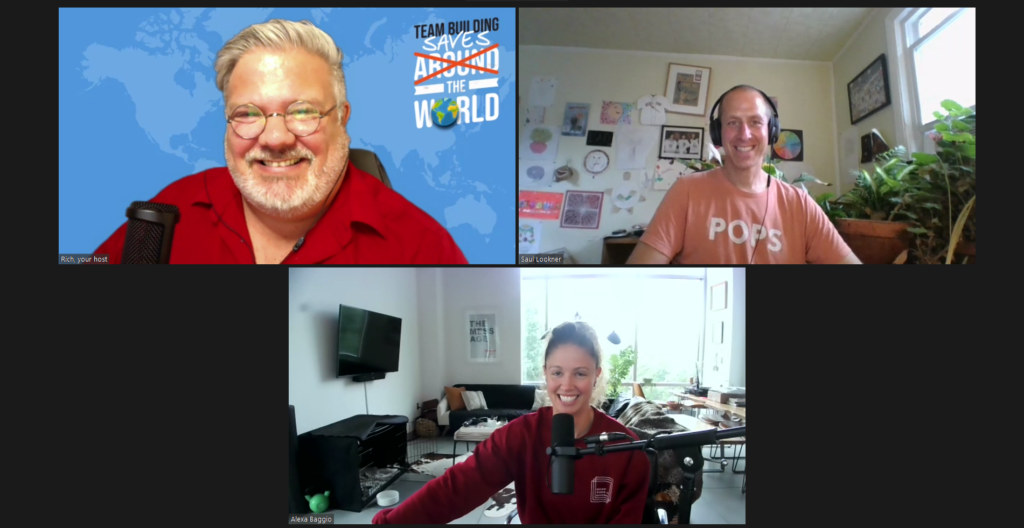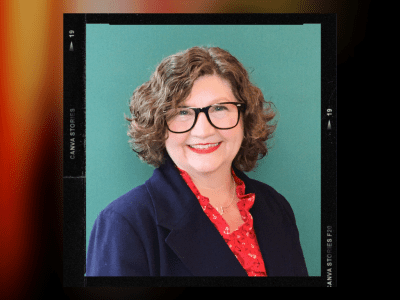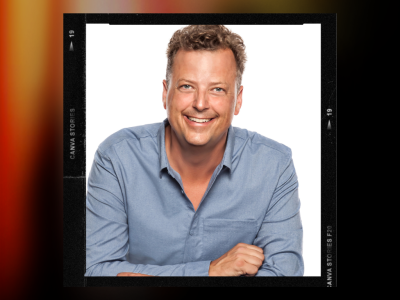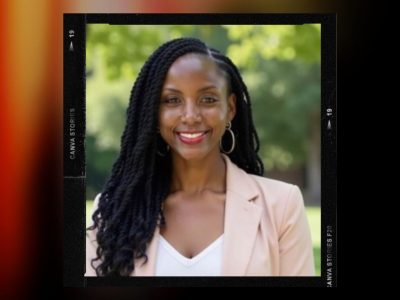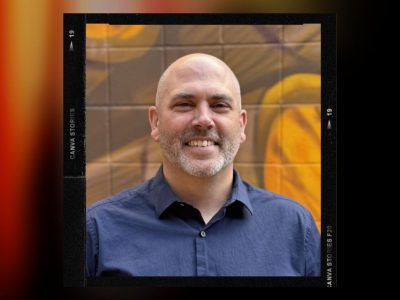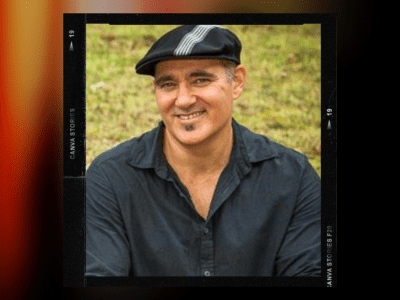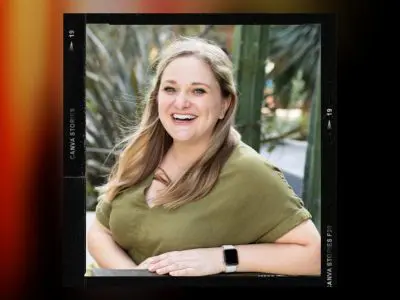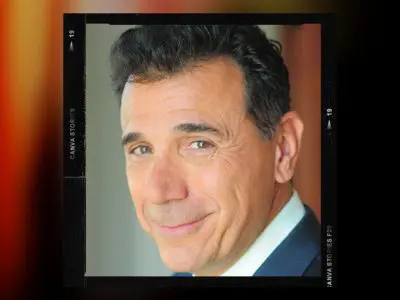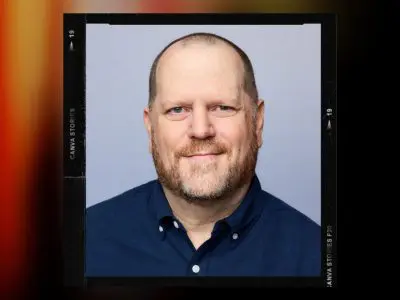PERKS of Employee Benefits
w/ Alexa Baggio & Saul Lookner
Use the buttons above to listen now.
Transcript - PERKS of Employee Benefits
Rich: On this episode of team building saves the world
Alexa: effectively, you have to be able to support and create a lifestyle for your employees. And that is truly your differentiator as an employer brand. This concept that like you just provide health insurance and dental and vision, and then like you’re done, right.
It doesn’t, that doesn’t work anymore. Right.
Saul: On a serious note though, to interrupt your lifestyle this year is the year also if mental health,
Alexa: I was just telling Saul this morning, how do you. One bite at a time.
Saul: Alexa, eat this. I don’t want to eat it now. Trust me
Rich: once again, it’s me. Your old friend, Rich Rininsland host of team building saves the world, The show where I speak to the leaders and innovators. In building industry from all across the globe, trying to find out what about that industry is so important, especially in the world of today. And today we are celebrating wellness with perks, director of benefit development and the CEO and co-founder of perks.
Perks is the nation’s leading employee experience and office innovation showcase for employers to find innovative and employee centric services. But first I need to send my thanks out to my supporters at team bonding. If your team is ready for experience to experience teamwork through the power. And visit team bonding.com to learn more.
And now my friends join me in welcoming the director of business development at perks, convention, Saul Lookner and CEO, and co-founder of perks. Alexa Baggio
That is just a small group of people. Like you’ve chained up under my desk. They’re here just to applaud you guys. That’s their entire. How are you guys doing today?
Alexa: It’s a good start. Thank you. You got a good crowd stuffed under there.
Rich: Thanks for coming on and joining us guys so happy to be here to start.
Uh, let’s start with you. Uh, Saul, what is perks and how did you get involved in it?
Saul: Uh, I told Alexa that perks would never work when she told me that was my whole claim to fame.
Rich: Okay.
Alexa: And he’s actually not wrong about that.
Rich: Well then Alexa, go ahead. Why don’t you start off, tell us about what. Because I know you’re the, you’re the brain child of it.
Alexa: So for better, for worse. Right? So, so, so we, you know, I’m the founder and CEO of perks. We are the employee experience company and we have under our, uh, sort of umbrella or purview here, we have three different, uh, brands that we have created and are the proud creators and curators of the first is the employee experience expo.
So that is a trade show that we host in six cities around north America. Boston New York, LA Chicago, San Francisco, and Toronto. Uh, and the goal of our trade shows is to show the employer community in that city, all the great, innovative, and cool benefits they can provide to their teams. Uh, so that’s our first brand.
Our second brand is called pops. It’s the people ops society, which is a exclusive community for people ops professionals to basically meet, share resources, take courses, and just kind of have a place for themselves to talk to them. We’re for the people, people by the people, people, as we say, and then our last brand is, is called showcase, which is the employee experience platform.
I don’t know if you’re sensing a theme here rich, but we, uh, the employee experience platform is basically both an app and a web platform that allows employers to what we say is basically solve the employee awareness problems. So make their employees more aware of what their benefits are. Um, alarming statistic, 59% of employees can not remember the benefits that they enrolled in, in the last open enrollment and over 80% do not know all of the benefits that their employer offers to them, which is alarming because we work with the people who, who choose all those things and do the hard work to make sure they have the right benefits and the right folks on the right services and the right lifestyle.
So our software is sort of basically designed to help solve that problem and put your employee experience in your employment. So that’s perks. That’s who we are. It’s all is sort of the, the heart and soul of our team over at Perks com as well as he works with our broker partners at showcase.
So, yeah.
Rich: Fantastic. Well, let’s start off with the very beginning, where did this all come from?
Alexa: Oh, good god. Um, many, many moons ago, 2014.2015 Something like that. I was the co-founder of a business called 2020 on site that does onsite eye exams at the office, which is like a, you know, it’s a foreign concept these days, but they’re, they’re back.
They’re coming back. And the whole idea was preventative healthcare, right? So this idea that, you know, some of these services like eye exam, they’re preventative, but they’re, it’s pretty easy to fall by the wayside. You tend to have some sort of coverage through your employer, but you know, getting to the eye doctor is actually more complicated than it sounds.
And thus people. And then, you know, it can detect things like heart disease and cholesterol, tos and all kinds of stuff. Right. So it is good preventative health there. So anyway, we, we built a business to be a free to employer paid for by employee benefits. So we would build these awesome 34 to 38 foot RVs decked out to be like this awesome, you know, sort of futuristic I doctor and I store sort of, you know, optical store on wheels.
And we were going to the employer community. I, one of the things I learned, right. Starting that that business was that there didn’t seem to be a place where employers could come to find services like 2020, or find services like, you know, a lean box or a team bonding. Like there were things that were existing in the world that were very traditional HR trade shows built around this idea of continuing education.
Right. You know, Sherman Neeraj. The groups that do sort of the educational and compliance content in the space, but there was not anybody that was like, Hey, there’s a lot of fun stuff you can do for your team too. That’s not just health insurance come spend the day with us. We’ll make sure you know about all that.
So we tested the idea in whatever that year was 2014, 2015 in Boston. We had like a little tiny trade show at the Microsoft nerd center, which no longer exists. Sadly. It was a cool. And we had something like 20 or 25 different vendors, everything from food to, you know, massages at work to, you know, kind of all the things we, we used to think of when we think of the Googlization of the workforce or the workplace, it was very food heavy, you know, Fooseball tables, that kind of stuff.
But that was many years ago. And we had like four or 500 people show up to our first event and we were just blown away. We were like, okay. People actually, yeah, I really do want to do this stuff for their teams. And they’re really struggling to find a sort of central location and see what’s innovative and see what’s out there.
And so our criteria was originally and basically still is. In order to be involved in the employee experience expo, you have to directly benefit the employee experience. So we don’t showcase anything that the employee cannot experience, touch, feel, look at go-to subscribed for that. They don’t then give credit back to their room.
Uh, so we don’t showcase anything that’s like HRS softwares or, you know, any anybody’s kind of behind the scenes. Uh, everything that we’re focused on is, you know, from electric car charging stations, to telemedicine and health care reduction and online events and all kinds of engagement stuff. So it’s been a fun journey, but yeah, that’s where this came from.
And then from there, we’ve just sort of grown into working with the employer community and we started to get some feedback that is people, operations professionals, they wanted a new community to talk about. People operations as a separate lens from sort of traditional HR. And so we started that group right before the pandemic and have been lucky enough to grow that over the last year.
And then showcase was born out of that because last year, a little before, a year from now, we started to hear employers as well as their benefit providers. Just go, what am I going to do this year? I can’t be onsite at a virtual benefit there or an onsite benefit. Fair. How do I do this work? And we said, well, we think we can help with that because we know this area really well.
And this is what we do all year is connect brands with employers and employees with brands. So here we are. Rich
Rich: Saul obvious question. Why didn’t you think this would work?
Saul: That’s a great question. My thought was, you know, I had been to other exhibits and, and conventions like that. Basically, as far as I had seen as an exhibitor, HR didn’t really want to talk to you or I knowingly went, went to conferences to talk to the exhibitors.
They almost went to avoid the exit. Hmm. So when Alexa had the idea and saying, Hey, you know, people do want this stuff. They will come. And I said, well, they probably don’t want to leave their offices to talk to the exhibitors. And I was wrong. You know, I joked with her about this. Now the litmus test is if I think it’s not a good idea, we just go ahead and do it.
Alexa: It’s literally, it’s literally like a north star cross. Like if solve things that won’t work, we’re going to do it. So far it’s worked pretty well, but we’ll say
Rich: let’s go talk about the employee engagement. Cause I was reading when I was reading through your bio’s on LinkedIn and on your website, I was struck by the modernizing, the workplace improvement and employee experience.
What do you mean when you say that? I mean, what is the modernizing of it?
Alexa: So back to the, sort of the Googlization of the workforce, right? This, a bunch of this stuff and all the innovative benefits and stuff around team bonding and culture, it all, it all came out of this concept of like, okay, highly competitive tech based employers, largely out of San Francisco to start or pouring money into these resources that are highly visible.
Two potential candidates, right? Things like, I think it was like Google head babysitting and laundry services on campus. And people like lost their minds. And what we say I saw for a while was people try to, to like, okay, let’s follow that rabbit down that hole. Right. We’re going to, we’re going to add all these onsite services we’re going to have, you know, all these sort of like tangible things we’re going to have Kega raters.
And that kind of became the norm for like a quote unquote, like the bellwether of your culture. Right. The reality is that that’s actually not. What is driving the cultural change? What is driving the cultural changes, especially millennials are the largest generation in the workforce right now. I am a millennial, so I can talk about us.
They’ve come to sort of, we’ve transitioned away from like these cute things that are novel, attracting talent and keeping talent to this idea of effectively. You have to be able to support and create a lifestyle for your employees. And that is truly your differentiator as an employer. So if it used to be that, you know, 30, 40 years ago, like if you had healthcare and dental and vision and a 401k, like you were at the top of the cream, cream of the crop as an employer.
Right. Because that was, that was where we were at 30 or 40 years ago. Right now it’s become. This kind of test for how many services and what are the, what’s the right combination of services that actually creates the culture and the brand you are trying to instill, because what I can tell you and what I know Saul kind of test do is we speak to every year hundreds of new companies that are trying to create services, products, subscription.
Technology, you know, whatever it is with the lens of the employee in mind, which did not exist 10 years ago. Right? Like when we started the perks conventions before we had any of this going, that was a fairly novel concept. It’s why we were so surprised when so many people came to our first event. Cause we were like, oh, you really do.
You really do. You’re interested in this. And so this concept I think, has transitioned away from novelty into more expectations. So the millennial generation has gone, has come to expect some of these things. And so now what that means in an increasingly digital world is that you need to align your experience explicitly with what you want to promote as an employer and what you are expecting your employee lifestyle to look like when I am sitting in front of a computer.
Staring at a bunch of squares all day, you know, doing my marketing, working my Google sheets, or, you know, recording my podcast on zoom or whatever it is in my day-to-day experience. You know, in this example, I’m the employee, but is actually differentiating my employer experience. Right. It’s just my butt in a seat in front of zoom and the work that I do on a regular basis.
Right. And obviously the people I do it for, but you’re never going to replace the people you work for. So I think the whole world has shifted from. Sort of this, this idea of like, oh, what, what’s the fun stuff I can say my employer does too. Like, what is the lifestyle that my employer affords me and supports me in.
And that’s amazing much more intentional way to build a team, to build a culture, to build benefits, you know, any of those things. And I think that the pandemic effectively just catapult. Into that philosophy, which is like, it is no longer about butts in seats and dry gray cubicles. And you know, none of that stuff is going to fly anymore if you want to be competitive, but it’s also not ever going to go back to like, oh, well we have a foosball table and a Kegarator
right. Those things were never, those things were just. They were, they were sugar cuts. They were, they were, they were like, Hey, look at us. We’re cool. Um, but now, like, you know, glass door is not going anywhere. Every employer, you know, worth any salt has information about their brand, their culture, their team, you know, sort of all over the internet all the time.
And now we’re in a world where you have to be very intentional about it. What are the things that you’re signaling to your team in the benefits? I mean, experiences that you’re providing and where are you getting engagement, right. This concept that like, you just provide health insurance and dental and vision, and then like you’re done, right.
It doesn’t, that doesn’t work anymore. Right. You have to be not only aware of what your team wants based on sort of who they are and what you want them to be into. Right. Maybe it’s fitness, maybe it’s, you know, it’s family time. Maybe it’s whatever that’s for each employer to decide, but you can’t. Ever kind of put the cat back in the bag on this.
And so it means we have to be more and more intentional and actually design these experiences, not just slap a bunch of stuff, that’s like cheap and free and in the budget and like, hope people engage with it. Right? You have to be able to not only test and measure what people engage with. You have to be willing to change what people engage with as your team.
So it kind of this philosophical shift from like nice to have to need to have. And, um, from kind of like more is better to be more intentional is better.
Saul: I also, I also think too, You know, whereas Kirk started off with the name perks. Now there’s not really a line, you know, I think people it’s sort of like, it’s all one bucket,
Alexa: it’s all the employee experience.
So excellent people used to differentiate between benefits and perks and now it’s like it, does it affect the employee or doesn’t it, does it contribute to your employer brand or doesn’t it it’s all the same. Um, you know, and I would argue that a lot of the quote, unquote, core benefits to using industry language, they don’t differentiate at all.
Hmm, right. Unless, unless you’re someone with a preexisting condition or a sick loved one or a certain set of circumstances, you need to be cautious of or aware of in, in switching employers, healthcare is a given and you only get usually two choices. And if you’re lucky, one of them’s a PPO, right. Um, you know, it just, it’s not, it’s no longer a differentiator, so you’ve got to go further, further down the stack.
And that starts to become, what does my lifestyle look like? When I’m here with this brand and what do they encourage of me and signaled to me is okay. Based on the experiences, the interactions, the benefits that they afford me,
Rich: that all sounds amazing with that in mind. I actually do want to take a second here, guys.
I need to step away just for a brief moment, because I want to take a second to tell my team about a company. I am very proud to be a part of team. Dean bonding was founded over 20 years ago. With one simple question. How can employees have a great time while fostering strong, authentic bonds between people who work together?
They’ve created a catalog of innovative events using the power of play as a learning tool and tapping into the correlation of work and play from scavenger hunts to jeopardy. So much more. The team bonding activities live virtual and hybrid maximize the impact of team building with an accent on. Visit team bonding.com to schedule your event now, team bonding when you want seriously fun results.
And I know for a fact team bonding has been so excited to be part of the perk conferences like everywhere you guys go we’re there.
Alexa: Yeah, we love it. You guys are a fun partner and like we’re big believers. We always joke, you know, if you can’t have fun at a perks convention, like you’re not going to have any fun doing this in general for a living.
So if you might want to, I want to rethink your profession. I mean, we had do champagne. When you walk in the door, there’s a DJ that spins all day there’s, you know, there’s all kinds of fun stuff happening at these events to give people a place for a day to come. Think and dream and use their imaginations for what they want to create for their teams.
And then take some of those ideas back to their, to their group and figure out what works
Saul: also regarding
regarding team bonding too. No, you’ve always done very well at our shows. I mean with the pandemic and everything being hybrid last year, people could not like, they’re almost like breaking through the screen to try to find you and get a contact person.
So it was really wonderful to see. Yeah. A lot of bad stuff happened during the pandemic, but some of the silver linings there were for groups like yours, that the need was really, really, really there and still is obviously people are being hybrid and stuff like that. So, right.
Rich: No, I was going to say, talking about let’s let’s look back at that. What was it like for you guys to go from live events all across the country to suddenly people can’t be closer than six feet from each other
Saul: dead air. A good way to say it.
Alexa: Yes. It’s like, it’s like that moment. And like the cheesy, uh, that cheesy medical shows where like the green line that is the heartbeat just kind of go splat for a minute and you’re like, are they going to resuscitate?
Uh, no. So you look as a business owner. It was survival mode, right? It was like, all right, this is, you know, our world has changed the medium we use to communicate. This message has been cut off from us, but I don’t think we ever lost sight of the vision that like, you know, I, we like to joke as an email.
Like if you, weren’t thinking about your employee experience before you better be now, because it’s only gotten harder as people have gotten more dispersed. Right. And I will, I will say preface that this entire home. We’re a remote team. We’re a small team. So we’ve always had the luxury of being able to be remote and do pretty well for ourselves.
But I have always been a huge believer in remote teams. I think the amount of autonomy and just ownership, it creates for teams, you know, certain sizes for certain roles is like a really positive thing. And people used to be like, how do you work from home? That’s crazy. I could never do that. Like, you know, I could never, you know, sit in my pajamas all day and, you know, do those things.
The answer is like, you probably shouldn’t sit in your pajamas all day. That’s usually make a productive day. You know, it, it was actually kind of in a way, making our point to watch the whole world first and foremost, do this, but also then look at things like open enrollment and the events they used to do and, and all these different things.
I used to put so much emphasis on and go wait bit. We have to be more thoughtful here and we have to do this differently. And there are so many organizations that were just sort of forced to relook at their experience and forced to rethink how they communicate to their teams. And for us, like that’s all we’ve ever wanted.
All we’ve, everything we’ve ever built is around. Sort of, you know, making HR lives easier and cooler and better, and maybe employee experience is better. And so for people to who would never have changed the status quo ever before to sit back and go, I think we have to like, actually think about this now.
Like we can’t just be medical, dental vision. We have to be thoughtful and we have to do things to engage our team. I mean, one of the biggest questions we got at the, at the beginning of the pandemic is like, what do I do? Team engaged. And then, you know, a year later the conversation was like, how many more zoom events can I do?
Like I’m running out of ideas here, which I’m sure you guys know all about, but you know, it was, it was a fascinating transition to see just who went like, all right, we got to ante up here and get in the ring and figure this out. You know, I think those employers that are probably thriving right now,
Rich: but now you’re going back to live.
Will there be a hybrid or are you just going forget virtual anymore? Let’s go straight back to everybody in the convention center
Alexa: yeah. So our core events are going to go back to in-person. There is just something magical about meeting people face-to-face and understanding what they want. And you’re never going to get that engaged.
Online for our event, right? You guys run very different events. You’re experts at online engagement. So I can’t speak to that. But when you’re, when you come to a trade show like ours, you are coming to both explore and discover services that you maybe wouldn’t have known about or interacted with before.
And you’re, and you’re, you know, you’re getting some education from, from the stage, from the stage a little bit around employee experience, design and data for all those things, but you’re really coming. To get a vibe for what fits for you and your team. And that’s pretty hard to reproduce in a virtual event.
We did very well with our virtual events. Last year, we were very lucky to be supported by some of the groups and sponsors that we were. We had, we had an overwhelmingly positive response to virtual events. Planning. A virtual event is like planning a TV show for a day. It’s very different than how do I get humans to.
Around each other, talk to each other, engage on certain subjects. So for us, I think at least at our core cities in-person is, is definitely the way to go with that said we’ve always rich known that there aren’t going to be places that we cannot host a, a full person convention. It does not behoove us for lots of reasons.
Namely cost to host some of these events at the scale that we do in smaller. Cities, right? Like we’re, we’re probably not going to have, you know, a perks convention in Santa Fe, New Mexico. Right. But there are employers there and they need services and they want to discover things. So we’ve always longed thought about maybe some sort of virtual convention anyway, for the markets where our, uh, perks and providers service additional employers outside of the six major metropolitan areas.
We’re in. This has really forced us to think, okay, what were the great parts about the virtual event that we want to keep? And when we go back to in-person or IRL, as I call it in real life, what elements of that should we be keeping and how do we mix those in such that it is kind of like a one-two punch, right?
Because when you’re in, when you’re. You know, Boston perks com that you can be confident in that room, that every provider that is their services employers in Boston, right? There’s no geographic restrictions. That’s a little different when you go online, because in theory, you’re at least a national provider about a global provider, but maybe there’s different constraints.
So it’s something to think about. And, you know, we, we also have our showcase software, which is designed to show off providers, to groups of people. So we’re, uh, we’re hoping to work that in and do something fun with hybrid this year. We miss in-person we love in-person.
Rich: Speaking of your providers, Saul, what’s some of your favorite items that have been put forth.
Saul: I mean, so I obviously love all of them to be very political, but
Rich: I would say, but team bonding is your favorite. We know. Go ahead. It’s fine.
Saul: I am always a big fan of massage. So Alexa will joke about the day of our show is I’m the one who’s making sure all of our teams. I also host Thanksgiving in my spare time.
Right. So Alexa, eat this. I don’t want to eat it now. Trust me. You’re going to follow her. Yeah. I mean all the, the food perks are fantastic. They often where they can they’ll bring in samples. That’s amazing. I also love massage. I mean, I love massage. So, you know, towards the end of the day, maybe I’ll sneak onto one of those chairs when I’m there.
But, you know, we have things like robots that make tea. You know, we have amazing onsite coffee vendors. We have a lot of mindfulness vendors who are fantastic. I’ve learned a lot from everybody. Listen, it’s going to sound crazy. But the fact that I know a lot about, or know enough to be deadly with HSA health savings accounts is because of the awesome HSA vendors we have there.
So it’s just, you know, different strokes for different folks.
Alexa: I love all it’s all deadly, I think is what he’s saying. Rich.
Rich: What about you, Alexa?
Alexa: I don’t play favorites. I refuse to, but
Rich: anything that stands out in your mind then?
Alexa: Yeah, look, I, we have seen people in the last seven years of doing this Rich
I see. Every year I go Saul this is where the buck stops. Like keyhole cannot come up with one more service for the employer market and every single year I am wrong. And so, you know, if two years ago the hottest thing on the market was financial wellness and financial education. I think this year it’s probably going to be something like hybrid engagement solutions.
So things like team bonding, it’s going to be thrive her, like all the, all the, like how do I keep teams that are dispersed engaged? And I think that’s the way the universe should be going to be fair. So I’m down with that. Yeah.
Saul: On a serious note though, to interrupt your lifestyle this year is the year also of mental health. Yes. And everything surrounding it. Right. So that could, yeah. Mindfulness meditation for people, or it could be the other side of it. I need a mental health calendar, a counselor now, um, and everything that cascades with it. So there’s just so many issues with that. Yeah.
Alexa: And, you know, we just partnered with better help on some of our shows who were really excited to work with.
Um, you know, there’s, there’s actually been this really fascinating trend. Rich, that’s fun to see over the last couple years of really large consumer brands getting involved in the employer space. And there’s lots of reasons I think that is. And I think it’s actually a really positive trend for a lot of reasons, but there are some really cool opportunities for employers to bring.
Again, I’m sort of thoughtful solutions and inexpensive solutions to their teams that give them a lot of power as an employer from a brand perspective. So something like better health, which basically everybody’s heard of her calm, all these guys have. Uh, they now have employer solutions, Uber for business, uh, you know, door dash for at work.
You know, there there’s all these huge groups that have the reason that’s positive is not only is it bringing things like mental health to like making it more accessible and also show. I think the really important thing about the mental health piece out there there is that if you are as an employer, showing your employees, it is okay to access mental health services, you know, and you’re not admitting that you’re not okay by using a service.
And that’s why it’s awesome. Right. Is it’s like it, my employer is telling me it’s okay to take care of myself, but the trend I think is really positive because it allows this lifestyle creation. Right. Which, which I sort of started this conversation with, which is it allows the employer to craft an experience to the employee in an inexpensive way.
Sort of with services, they can access really easily that are built for good engagement and to do that as an employer brand. And that is something that is like a total paradigm shift. I mean, when you, we couldn’t do that five years ago
Saul: and we’ve seen some of our groups like, you know, fringe, right, where people, you know, can make these choices or we’ve seen journey meditation going to be journey.
And, and now that they are in some of the mental health space too, as well, but they’re not sure not competing with better health augmenting. It. It’s a lot of really interesting progress. For how each groups are handling everything. So we’re just like fun to watch it. In some ways I have a 12 year old, a nine year olds. I’m obviously not the parent there, but I get to watch the brands grow up. So it’s like best of both worlds. I don’t have to parent them. They can do it their own, but I can watch them from afar.
Grew up in this class.
Rich: Yeah, it was good. I was going to bring that up because your place now in corporate culture, I mean, how many different generations of people are now working for a living
Alexa: Four almost five?
Rich: So, how do you make sure that there’s something for every.
Alexa: Hmm, that’s a phenomenal question. So I actually think, making sure there’s something for everyone is maybe the easier piece of this problem to solve, right? Because if you look across the generations, we actually have a very cool infographic that talks about this.
But if you look across the four generations and you go like, okay, at this moment in time, where are millennials? Right? Like most millennials are somewhere between getting married, buying a house and like maybe starting to worry about aging parent issues. So boomers are definitely worrying about aging parents and gen whatever’s behind millennial gen Z years.
You know, the kids are on their phone all days, the first digitally native generation. They’re like getting back to an office. Cause I want to meet my coworkers and, you know, have parties and, and, you know, do kind of the crazy interaction stuff that happens when you’re like young in your career. Right. And so if you’re looking at the gen Z or all right, we should have, you know, drizzly at work.
We should have some of these great food benefits set up. We should be making sure that we’re doing on onsite. In-person very intentional events when we bring people back to the office. If you look at the millennials, you’re like we should be probably providing some sort of financial education benefit.
We should be probably have some sort of aging parents, something like you can actually, the beautiful thing about where we’re at today, rich is though all of those services exist there’s almost nothing an employer has ever asked us to find for them that doesn’t exist as a product that they can offer to their teams.
So that’s not the harder thing to solve. I think the harder thing to solve is how do we break down? This idea of a, it is hard to do that. And B that utilization is going to be really low, so it’s not worth it. And those are two pieces of like the, the employer brand. I mean, employee experience stigma. I think we just absolutely have to get rid of, because first of all, it’s not hard.
Like groups like us exist explicitly to make it not hard for you to do this stuff for your team. Wait, there’s nothing we love more than helping people pick the right perks and benefits and providers to work with. We do it all the time for groups. Also, it doesn’t have to be expensive. Uh, but this idea that like, oh, I’m if my whole team can’t use it or I don’t get, you know, 75% engagement with this thing, why would I do it?
And it’s like, well, let me, let me reverse the question, right? If you could get 10 of your team members and eye exam at the office instead of zero, would that be worth doing it? And the answer is almost always yes, but when you have four generations of people in the workforce and you’re offering this sort of like smattering of things across the generation, You’re never going to be able to hit a home run every time.
Sure. So you have to like, we have to get employers as they’re designing their brands to understand what you’re trying to do is optimize for each person where they’re at. You are not trying to optimize the total package because you can’t, you’re going to have certain things. You’re going to have certain things that half of your population.
I’m not interested in like fertility benefits, right? Like you’re never going to have a fertility benefit that has a hundred percent utilization. That would be crazy for lots of reasons. But like, you know, you’re also never going to have a physical fitness benefit or a wellness benefit that, that pertains to everybody because everybody is at a different place in their physical fitness benefit in their journey, you know, their health, their health story.
So you may have a really intense. Fitness offering that 10% of your population uses. And you should be stoked about that as long as you’re not paying for the other 90%. And you may have, you know, a meditation app that gets used by 60% of people. And that’s also awesome, you know, because it’s accessible, it’s easy.
It’s daily, it’s, you know, it’s, it’s, there’s a, you know, so I think there’s the, the harder part of accessing this conversation, which is, I was just telling all this morning, you know, how do you. One bite at a time. And we have to get people to understand that when you’re dealing with this many people and this many generations and this many expectations.
You cannot be everything to everyone. You have to pick the things that are going to cover your population, and then you have to tailor them to what you, as the employer actually want to promote. Right? So if you want to tell your team, we really care about lifestyle and balance and mental health and wellness.
Like those are the things we are going to actively promote to you as a brand, as you are. Then you need to follow that, right? If you’re like, well, we want you guys to worry about your own health and wellness, but we care about making sure that the office is a really engaging place and you’re going to build benefits and systems around that.
So I think this, it gets sort of, uh, blown into this like unfortunately larger conversation than it is. And the reason we’re excited is that like, this is what we’re hearing. The world is here. You know, the, the days of it being hard to build a great employee experience are over that. I can say competently, nice.
The
Rich: conventions, just for employers or employees as well.
Alexa: We welcome anyone who is an employee. If they want to attend largely the people that attend our employers. So anyone who is involved. Buying for the employee experience effectively. So that’s usually HR or culture or people or benefits from, you know, CHRs.
Sometimes you get CEOs, sometimes you get COO’s and then also the broker community. So we have lots of awesome partners in the Mercers and the, you know, the NFPS and the Locktons et cetera of the world, uh, who make it a point to make sure that their clients are there so that they’re also aware of what they can make an offer.
Um, and so we, we obviously welcome the broker community. Uh, with open arms because they sometimes are sort of the perfect liaison between maybe all the pressure. The employer is feeling from a benefits perspective and the marketplace. And like I said, the marketplace has not gotten smaller in the last, you know, five to 10 years.
It has, it has exponentially grown to, it would be almost impossible to keep up with all the services that we talked to. Although we’re trying, you know, every year we put out a big book of perks, which is a hundred, a hundred perks and services you need to know about going into that year. And every year rich, we cut out like.
At least 40 of them, just because it’s like some categories gotten really hot and you know, it just, it’s always changing, which is awesome. It just makes it hard to, it sounds like
Rich: you just need more conventions.
Alexa: Yeah. Clearly
Rich: so what are you looking most forward to for going back to live events?
Saul: I mean, all of it, it’s a rush of live events. The people, the people who are there. The happy hour is also wonderful. But when you work, we’re like we’re a really highly functional team at perks. Alexis is a fantastic leader, right? She has the ability to get you to see what she’s seeing.
So you can act like you think she would, you know, and she trusts you to act. So in that way, um, uh, we all function autonomously, but we’re all functioning as a team. And, uh, I love work. In that aspect of it. Uh, we’re a fun show. We’re not stodgy, right? It’s a one day event. So we’re flying in on a Tuesday that shows on a Thursday we’re out Friday morning and in between there’s a lot of fun work and a lot of interaction.
It’s, it’s a rush. So that’s something, we definitely get our steps in. That’s for sure. A hundred
Rich: percent Alexa same question. What are you looking forward to most?
Alexa: I am looking forward to. So the best part about our events rich is at the end of the day, when the people who are like a little shy to walk in a little stressed out and worried about all these things come out of the end of the day, usually have a drink or two, although not always.
Um, and they just. Invigorated. They’re just like, this was fun. I thought about things I don’t get to take a minute to think about. Um, I’m excited to go talk to my team about some stuff and some things I want to do for our people. Right. And that is literally what the show exists for is like to give employers imagination around what should be they should be doing for their teams.
And so what I’m most, I’m most interested in and most excited for going into this fall and sort of the next year of stuff is that, that. Uh, sort of exponentially combined with the excitement that everyone is just feeling about being back here. So like when you take the concept of life before, it was fun, even when you were taking events for granted and before the concept was great.
If you were truly someone who was forward thinking and wanted to take care of your team, and now I think we’re coming into this, this awesome sort of opportunity to, to bring a lot more of the employer community with us to say, you need to be paying attention to this fund, to pay attention to this stuff.
And oh, by the way, You’re going to meet some really awesome people. And you’re going to have a really fun time at, you know, the happy hour or taking a yoga class or whatever it is that we do with those particular events. So I’m really excited for those two things to sort of happen at the same time, you know?
Cause it’s kind of like a lunar eclipse. Like I, I don’t think we’re going to get many of these opportunities where everybody’s like, yeah, me too, a large convention. I’m ready. I’m ready to go. So I’m excited. Um, I’m excited for that. The general energy at our events is like a ton of fun. And so that, yeah.
Just, you know, being back together again, uh, as real humans I think will be a pretty awesome. Yeah. Excellent. Once
Rich: again, once till, uh, my team out there when and where they can find them.
Alexa: Ah, so you can find our events. Uh, this year they are packed a little close together this fall. Uh, usually they are spread across the, the spring and the fall, but you can find the schedule for all of our events at perks, con.com.
What does that say? Perks convention, but for ex-con. And you can find information about everything we do@poweredbyperks.com, which has information about all of our brands, but our schedule starts. Our first event is August 25th in the San Francisco. Uh, which we are very excited as our first San Francisco event.
So we’re very excited. You’d think it would have been our first event, but because San Francisco is like the birthplace of all of this. Yeah. But we’ve been dragged there and we’re excited to launch our first event there on August 25th at med city view at Metreon. And then we end in October with our last two shows our Chicago and Toronto.
Nice.
Rich: Yeah. So, Alexa, thank you so much for coming on board. This sounds great. I have been hearing for the office with team bonding, hearing about the conventions and very upset when I’m not the one who’s picked to go and present, but they understand, but thank you so much for coming on board, but I, um, I hate to do this to you because now it’s time from a speed run.
no cheese unturned. Okay guys. So the way this works, it’s very simple. In 60 seconds, you, as a team, we’re going to try to answer as many easy questions as you can, the way it will work, because there are two of you is if I ask a question that I do not name a specific. Whoever answers first, that’s your answer.
But if I name a specific person, it’s up to that person to answer, you guys will
Alexa: have 60 seconds trivia. Just fair
Rich: warning. It’s not a really tribute thing. It’s more of a, Hey, you’ll see. But when the music starts, I’ll start asking questions. So if you guys are ready right here we go. Ready? All right. Saul, how many kids say you had
Saul: two?
Rich: How many and which one’s your favorite?
Ah, nice. Alexa. Alexa, if you had a movie made of your life, would you consider it a drama comedy, romantic comedy action. What
Alexa: a psychological thriller.
Rich: . And. What would you like to do on a rainy day?
Saul: Look at my garden.
Rich: Jumps off. Look like. Yep, yep. Yep. Uh, Alexa, who is your favorite athlete?
Alexa: Oh, geez. Uh, Mia. Hamm,
Rich: I’ll take it. All right. If a Saul if you were guaranteed success in a different position, what would you want it to be
Saul: a massage tester?
Rich: Well done. My friends that is six, six answers done in a minute. Cool. Done. So once again, guys, thank you so much for coming on board and thank you to all my team out there that is going to wrap up yet. Another episode. Of team buildings saves the world. If you are a fan, thank you. If you are a fan of this podcast or you’re just experiencing it now, please share it with your friends, your coworkers, your associates, whoever you may know, you find a stranger on the street and say, Hey, I’m listen to this podcast.
You should check it out. Let them know you can find us on all the social medias at teen bond podcast. You can also find this on YouTube, where we have excerpts for each of these shows to BC. And so you can actually see the lovely people I get to talk to. If you go on the social media is don’t forget to leave us a comment so that I can read it in future episodes, because I want to hear what you guys think as you’ve been listening to this show.
Once again, thanks to Saul, Lookner and Alexa Baggio guys again. Great show. Thanks so much for coming in.
Alexa: Thanks for having us,
Rich: but that’s going to be, that’s going to be it for me. My friends. So much team and never forget this point forward, you were always on my team and I will forever be on yours. From all of us here to all of you.
Take care of teams and I’ll see you next time.
And said that you learn more about a person in an hour of play than in a year of conversation. So why not put your coworkers to play with the help of the team at team bonding team bonding was founded over 20 years ago with one simple question. How can employees have a great time? Fostering strong, authentic bonds between people who work together.
Their catalog of innovative events include scavenger hunt, jeopardy, and much more. Each activity, whether live virtual or hybrid, maximizes the impact of team building with an accent on fun. Visit a team bonding.com to schedule your event now, team bonding. When you want seriously fun results. .
August 9, 2021
Founder of PERKSCon, Alexa Baggio, and Director of Business Development, Saul Lookner, speak to Rich about the evolution of employee benefits. PERKS was created to help businesses and employers give their teams access to various benefits and services around their city. Today, employee benefits are so much more than just health, dental, and vision. Benefits allow employees to create a certain lifestyle with the help of their employer. Do you know what your company offers? Check out a PERKSCon in your own city or look at their virtual showcase to get new PERKS for your team.
Saul Lookner
As the Director of Business Development for PERKS, Saul is responsible for identifying and shepherding new PERKS and Sponsors into the community. Prior to PERKS, Saul was the Plan Director for the HomeBenefitIQ program. He acquired and oversaw all accounts, volunteers, marketing, and communication for the program.
Alexa Baggio
Founder of both the PERKSCon (PERKS) and the People Ops Society (POPS), Alexa has been working to fundamentally improve ‘traditional HR’ practices through immersive experiences and thought-provoking interactions for both employers and their employees.
Alexa first entered the people industry in 2014 after co-founding 2020 Onsite, a mobile optometry clinic providing convenient and high-tech eye care to employees at the office. Around that same time, Alexa founded The PERKS Conventions to make employee-focused services easier to discover, access, and afford. At present, PERKS has expanded to six cities across the continent and is the largest Employee Experience expo in the world.
In 2020, PERKS created Showcase™, an innovative virtual benefits fair platform that empowers employers to host live info sessions, eliminate hours of work wrangling vendors, and improve employee experience communications all year round. She holds a B.A. with Honors from Brown University and currently lives in Cambridge, MA.
Our PERKS discount code: GOLDENTEAMBONDING
See if PERKS will be near you!
- San Francisco: August 25th
- New York: September 9th
- Boston: September 15th
- Las Angeles: September 22nd
- Chicago: October 6th
" You have to be able to support and create a lifestyle for your employees. And that is truly your differentiator as an employer brand. This concept that you just provide health insurance and dental and vision, and then you're done, that doesn't work anymore."- Alexa
Get more human resources and leadership advice.
Less drama? Greater teamwork and job satisfaction? TeamBonding is here to help you build a stronger and happier team. Subscribe to get our team building podcast and thought leadership blogs sent straight to your inbox.
